Becoming an avocado grower
The New Zealand avocado industry 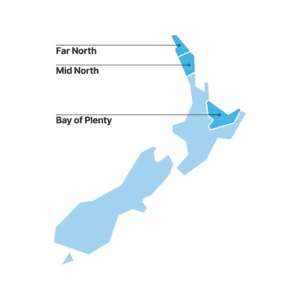 is pursuing exciting opportunities in both export and the New Zealand markets, supported by innovation and collaboration with stakeholders and with new partnerships with the Crown and Crown Research Institutes.
is pursuing exciting opportunities in both export and the New Zealand markets, supported by innovation and collaboration with stakeholders and with new partnerships with the Crown and Crown Research Institutes.
New Zealand currently produces just 2% of the global supply but is the ninth largest international avocado exporter. There are over 4,000 hectares of avocado trees planted in New Zealand, primarily in the Bay of Plenty and Northland. Global and local demand for the super food is sky rocketing.
Avocado production does have very irregular swings in volume and this needs to be accounted for when planning your orchard .With the right preparation and understanding, growing avocados can be a very exciting prospect.
Click here to for more information about Grower registration and to apply for a PPIN
Due diligence before investing in avocados
Growing avocados in New Zealand is an exciting venture but it is not an easy venture. Avocados originate from Central America, so growing avocados in New Zealand’s wetter, cooler and windier climate poses all sort of challenges. We recommend you think hard about a number of things BEFORE you invest in avocados.
Starting out guide – information about the New Zealand avocado industry
If you do not have a website login and would like to view this document please contact info@nzavocado.co.nz. You’ll need to provide proof you live in NZ and explain why you’d like access.
Starting out guide - information about the New Zealand avocado industry
Buying an existing orchard
We highly recommend you get the packout reports from the previous owner for at least the last three years. This tells you the volumes produced, by class and size. The previous owner should provide these without issue, unless they are trying to hide something. They can ask their packer to provide you those reports directly, if the grower no longer has them. Don’t rely on the land agent to tell you the production figures, get the reports so you can see for yourself.
There are a number of factors impacting production, including site and climatic conditions, the amount of “care” that has been given to the orchard and the type of advice being used on the orchard. All those things will influence the return from the production of avocados from the orchard.
Your return will be strongly influenced by:
- Yield in tonnes per hectare. Across the industry we believe to be economically sustainable an orchard should be producing at least 7 but ideally 10 or more tonnes per hectare. The yield of the orchard is calculated by taking the volume in 5.5kg trays * 5.5/1000/productive hectares.
- Export pack-out: the percentage of class 1 avocados, we call this the export pack-out.
- Average size is also important, the lower the average size, the larger the size profile of the avocados being produced. All avocados are packed in a 5.5kg tray, which takes 20 larger sized avocados, or 30 smaller avocados. So if the orchard is producing average size 30, you need 50% more avocados for every tray, plus the return from a size 30 tray will be considerably less than a size 20 tray.
- On-orchard costs. The amount of work you are going to do on your orchard versus paying someone to do the work. On-orchard costs range from $10,000 per hectare to over $30,000 per hectare depending on a number of things including the fertiliser inputs, the amount of pruning, the application of mulch, irrigation, pest control, weed control and a number of other factors.
If considering an existing orchard the following actions are recommended:
- Request the past three years’ production records, returns and the cost of inputs applied to the orchard. Do not rely on verbal assurance from the seller or real estate agent without seeing information from the orchard’s packhouse.
- Obtain reports from the packer or exporter to confirm previous production.
- Look at the packout data and identify the percentage of avocados that went to export versus class two, three or processing. This indicates the ability of the orchard to produce premium, export grade fruit.
- Request that the current owner authorise NZ Avocado to share data on previous productivity (benchmarkeing) on the orchard. This can be done by emailing admin@nzavocado.co.nz with a subject line: Authorising orchard data to be shared.
- Obtain a copy of the ‘Library Trays’, reports that give an indication of the quality of avocados produced on the orchard.
- Identify the packing facility and exporter the current owner uses. Speak to the grower representatives at these organisations and seek their views on the pros and cons of the orchard.
Planting an orchard
In the same way you need to undertake due diligence prior to purchasing an existing orchard, we strongly recommend you undertake due diligence when you buy land with the intention of planting avocados. New Zealand does not have the perfect climate for growing avocados so the combination of orchard location, soil type and orchard management will have a significant impact of the success of an avocado orchard investment. Avocados need a lot of care and attention to grow well in our wetter, cooler and windier climate than where the avocado originates in Central America.
We recommend you talk to other growers, read the available information, see the ANZ guide here, and call a packhouse (or two) to get one of their grower reps to share their knowledge of the industry with you.
All of the factors listed in the section above on buying an existing orchard will apply to you, as you plan your investment.
Do seek views of others. NZ Avocado and packers host fielddays where you will find other growers happy to chat about their investment. There is a lot of information in other parts of this website. Do the numbers. Think about your goals in growing avocados, and make sure the numbers stack up for you.
Initial planning should take into account:
- Site selection including soil type, aspect, wind, run-off, temperatures in spring and likelihood of frost
- Infrastructure around shelter, irrigation, fertigation. Where is your water going to come from?
- The rootstock or fruiting cultivar you will plant
- Availability of bees for pollination, labour for harvesting and pruning, expert advice on nutrition for tree and soil
- How will you manage the orchard. If you want it managed by contract, who might you seek to do that
- Are you growing for export or NZ market only?
- Compliance requirements
- Budgets and working capital required
We encourage grower to join our industry but would prefer they are well informed about the challenges as well as the opportunity for avocados, and have good plans in place to get the outcome they desire.
Where can I get information on how to grow avocados?
The majority of packhouses have grower representatives and technical teams who support growers with advice and knowledge. Independent orchard management companies also offer a full range of services and equipment for growers. Field days, publications and knowledge sharing amongst growers will increase your knowledge base. A list of packhouses and orchard management companies can be found in our industry directory.
Once you are a member of NZ Avocado you will have access to further information on our website. Member only content on our industry website includes:
- Vital information about how to grow avocados.
- Industry news, events and publications.
- Latest research publications and findings.
- Tools and resources to help improve your orchard.
- Directory of industry companies and contractors.
- Material on pests and diseases.
- Videos and articles on orchard management.
- Best practice recommendations – pruning, thinning, new plantings and more.
- Links to industry systems pages including Avogreen, spray diary, avotools and export registration.
- A range of grower manuals and guides are available for purchase in our avoshop.
What do I need to consider?
Site selection is the most important consideration when establishing an avocado orchard, or purchasing an existing orchard:
![]() Aspect
Aspect
Best light conditions are north-east and north-facing orchards. Be very aware of areas prone to waterlogging.
![]() Wind
Wind
Protection is required for possible tree and fruit damage in high-wind areas.
![]() Water
Water
Irrigation is required for heavy crops in areas with low summer rainfall and possible frost protection. If you’re buying and exiting orchard, it’s important to find out weather it already has irrigation.
![]() Physical soil attributes
Physical soil attributes
Well aerated, well-drained soil is required for healthy root growth and limiting root-rot pressure.
![]() Winter and flowering temperatures/light intensity
Winter and flowering temperatures/light intensity
Avocados are a subtropical plant, preferring warm weather, minimal frosts and good light intensity to yield well.
![]() Chemical soil attributes
Chemical soil attributes
Adequate nutrition is very important for sustained yields and sizing. Fertiliser amendments can address most issues.
Orchard design
The type of avocado tree and subsequent spacing of those trees is an important consideration when designing your orchard. There are two types of rootstocks available in New Zealand:
- Seedlings – Hass grafted onto Zutano rootstocks. Until 2012, nearly all New Zealand avocado trees were this variety.
- Clonals – Hass grafted onto imported rootstocks that are propagated clonally for commercial use. Clonal varieties have been selected for New Zealand conditions.
Trees are normally grown in a nursery for two years before being sold. Growers may get a crop at year three and full production after six to eight years. See the NZ Avocado website for information on different tree cultivars.
Planting density is intended to maximise yield per hectare. When choosing your orchard design, take into account light, future pruning and the health of the soil. Planting density can vary from high-density planting of 400 trees/ha (five by five metre spacing) to lower density of 100 trees/ha (10 by 10m spacing). High density plantings can be thinned later to avoid trees shading each other. There are currently a number of commercial trials looking at different tree spacing. Your final decision should be based on what you want to achieve moving forward.
Click here for more information on planting and preparation
How much will it cost to establish an avocado orchard?
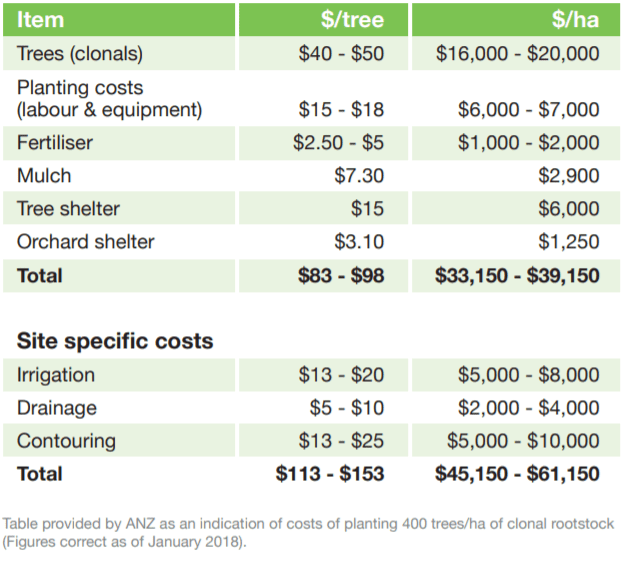
Below are two example costings for planting seedling and clonals. Please take independent advice in regard to what might suit your land and management style. All information is a guide only.
Other orchard costs include; picking/harvesting, fertiliser, pruning/thinning, pollination, phytophthora control, mulch, irrigation, spraying and general maintenance. A big proportion of this is labour focused. Aside from the initial establishment costs listed above, ongoing operating costs differ by orchard and a grower needs to weigh up how much they do themselves versus contracting out.
What returns can I expect?
What is the yield history and export pack out rate of the existing orchard? Historical data on the production from your orchard is available from NZ Avocado with permission from the previous owner. This can be included as a condition in the sale and purchase agreement of the property.
Are the estimates of income and expense in your proposed budget realistic?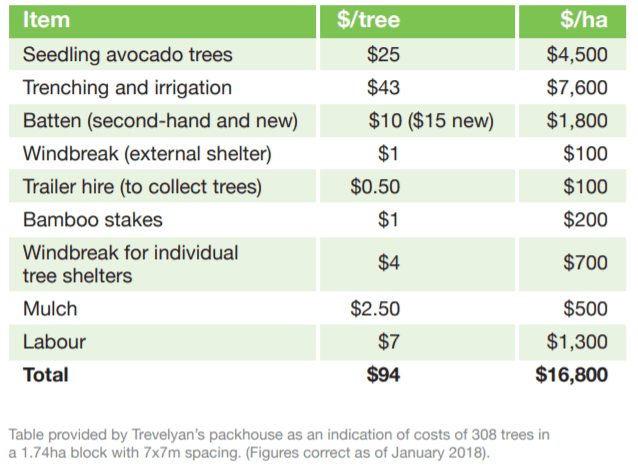
Your returns will depend on a number of factors:
- The yield from your orchard measured in tonnes or trays per hectare.
- Your export packout. Most class 1 fruit is exported, class 2 fruit sold in New Zealand and class 3 sold for processing.
- The return from both export and the New Zealand market achieved by your exporter or marketer.
Generally returns are reported as orchard gate return (OGR) per tray. These are often separately reported for the export and New Zealand markets. NZ Avocado reports OGR per hectare for the industry as a whole in their annual report.
Orchard gate return
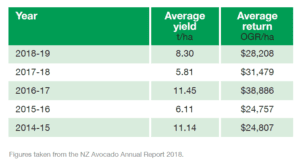
The global demand for avocados and current lack of supply has pushed the returns for avocados to very high levels. Orchards may wish to prudently budget at $12 – $20 OGR per tray.
What is OGR?
Orchard gate return (OGR) is the industry metric used to measure money an orchardist gets before on-orchard costs.
Who can help me take care of my orchard?
Growers can either manage their own orchard or contract orchard management services. Even the most experienced growers will utilise industry consultants for on-orchard services including canopy management and a spray and fertiliser programme.
How and when do I harvest my fruit?
Avocados do not ripen on the tree and must be at the correct maturity before they can be harvested to ensure premium quality fruit in market. Your packhouse will monitor your crop and let you know when it is ready to be harvested. Harvest dates are dependent on dry matter (maturity) readings, residue clearance, crop flow into market and weather. Once harvested, avocados only have a shelf life of approximately 30 days so are ‘stored’ on the tree to manage flow into market.
How do I get paid?
Payments will come from your packer/exporter under your commercial contract with them.
Where does my fruit go?
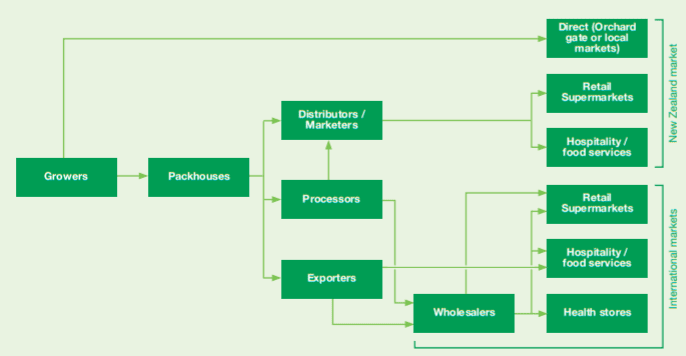
60-65% of New Zealand’s avocado crop is exported each year between August and February. 25-30% is sold over 12 months in the New Zealand market with 8-10% being sold for processing (e.g. oil). Australia is the largest export market taking around 80% of export volumes.
Exporters are developing Asian markets including South Korea, Japan, Thailand, Taiwan, Singapore, India and China. Exporters are all members of the Avocado Exporter Council (AVEC) and work with NZ Avocado to market and promote New Zealand avocados in all markets.
What do I have to do if I want to export my avocados?
- PPIN (Orchard identification number) – If you are taking over the ownership of an existing avocado orchard, are developing a new avocado orchard or are leasing an avocado orchard you need to have a PPIN. This is required to become an NZ Avocado Growers Association (NZAGA) member.
Please note that if you are taking over an existing orchard with an existing PPIN you will need to arrange for a new PPIN to reflect the change in ownership.
- AvoGreen® compliance – All growers intending to export avocados must be AvoGreen® compliant as of 1 November of the preceding season. AvoGreen® is a responsible and auditable avocado production system which uses the principles of Integrated Pest Management to ensure pesticides are used only when pests are identified. Growers can choose to either engage an operator to do their monitoring of pests or monitor as an Owner-operator by becoming an NZ Avocado accredited pest monitor.
- Contract with packer and exporter – Each season a grower must contract with a packer and exporter to pack and market their avocados on their behalf. It is the grower’s responsibility to read and understand their packhouse/exporter contracts and raise any concerns they may have with their representative.
- Export registration – Growers wanting to export avocados must register for export with NZ Avocado.
- Spray diary management – Each orchard must have an up-to-date spray diary. Once a grower has an agreed pick date with their packer, a harvest entry must be created within the diary, accompanied by a declaration that the diary is true and correct.
What does the future for avocados look like?
There is a surge in orchard plantings in New Zealand as a result of the recent returns achieved. There are 3,800 hectares in production with an expected 1,000 hectares likely to begin producing in the next two to five years. The industry is confident there is market demand across the export and New Zealand market provided we continue to produce high quality avocados that meet consumer needs. The industry has five year goals that continue to see growth in sales, increases in supply and the development of the China market.
What are the risks?
Avocados are a horticultural crop and this comes with a number of risks.
Biosecurity is the industry’s biggest risk and NZ Avocado is proactive to mitigate the risk of biosecurity events in the industry. There are a number of potential pest and pathogens that New Zealand currently does not have. The industry has signed an agreement with the Government that includes a comprehensive plan for mitigating key biosecurity risks and a response pathway for any incursions that occur.
As with any horticultural industry pest and disease are always a risk factor for avocado growers. The NZ Avocado industry has an integrated pest monitoring system, AvoGreen® which monitors for pests of concern and ensures that pesticides are only used when required. The two main diseases that affect avocados are root rot caused by Phytophthora cinnamomi and fruit rots caused by a range of fungi. These diseases are controlled with spray/chemical applications and integrated management systems based around good nutrition, orchard hygiene, careful handling, post-harvest treatment and temperature control.
Climate challenges
Avocados originate from Central America therefore New Zealand growers face challenges from our cool, wet and windy climate. The influence of these factors can be managed by appropriate site selection and site preparation.
Irregular bearing
Hass avocados are inherently alternate bearing, meaning they over crop one season and under crop the next season. Additionally, avocado yields can be negatively impacted by weather challenges. This results in very irregular yields from one season to the next. Research and trials to help mitigate irregular bearing in New Zealand are being undertaken and growers should be proactive on their orchard to mitigate these risks.
Additionally, poor orchard management and mishandling during picking and packing, can seriously affect the yield and quality of fruit being produced from your orchard.
Click here for more information on the two year growth cycle of an avocado tree.
It is also important to find out whether the plants on the orchard were sourced from an NZAGA accredited nursery.
Due diligence
Growing a good yield of quality avocados requires your time and energy:
- understanding the growing environment
- undertaking good practise on-orchard
- utilising expertise from other growers, avocado consultants your packer or NZ Avocado
New Zealand does not have the perfect climate for growing avocados so the combination of orchard location, soil type and orchard management will have a significant impact of the success of your avocado orchard investment.
- Check out these things before you plant or buy
- Avocados need shelter, warm temperatures in the Spring and near frost free conditions. South facing windy environments will not grow avocados well.
- Think about whether you plant clonals or seedlings? What tree spacing should you use? How many pollinisers should you plant? Do you need irrigation?
- Preparing your land is also very important. It is much easier to do this prior to planting rather than afterwards.
When weighing up an avocado orchard investment decision you need to consider the following factors:
- What time am I prepared to invest in this orchard?
- If I haven’t got time, where will I source the labour to do it
- What commercial relationships do I want for growing, packing and exporting?
- What return am I expecting, and is that viable? Avocado trees will start to yield in year 3 or 4 but unlikely to be at full production until year 6 or 7. Prior to them yielding fruit, the on-orchard management needs to be undertaken each year. Do your budget to know how much you will need to invest before you have an income.
If purchasing an existing orchard:
- Has the current owner shared the past 3 years production records, returns, and the cost of inputs applied into the orchard? If not, why not? Don’t rely on verbal assurance from the seller or your real estate agent that it is a great yielding orchard without seeing the information from their packhouse.
- Which packing facility and exporter does the current owner use? Speak to the grower liaisons at these organisations for their views on the pros and cons of the orchard.
Industry information suggests that for an orchard to be economically sustainable it should yield more than 2,000 trays per hectare, on average a year.
- If the orchard is not yielding those volumes, what are you intending to do differently to increase that yield?
- Is that feasible?
To achieve this average yield day to day management of the orchard is required. Having a consistently productive and profitable avocado orchard is a lot of work!
Average annual cost of inputs into an existing avocado orchard is very varied and depends how much you as the grower are going to do.
- when day to day functions such as mowing, pruning, fertiliser application and pest monitoring and spraying are performed by the grower costs range from around $10,000 per hectare
- For orchards that outsource these functions, running costs are up to and can exceed $30,000 per hectare per annum.
- Do ask how much was done by the previous owner, and do your own assessment of whether the results suggest this will provide an economic return for you.
Expertise in avocados is at times in short supply so it is not always easy to get perfect or prescriptive advice on growing avocados in a small (under 4 hectare) orchard.
Investigate your options for your packer and exporter before you make your purchase or investment decision. Get as much information from them as you can about the existing orchard or site for the planned orchard development. Key questions to ask can be found in the guide to grower/packer and grower/exporter contracts page here.
How can NZ Avocado help?
NZ Avocado is the industry body for the avocado product group. We work alongside avocado growers to pack goodness of New Zealand into every slice of avocado we share with the world.
We operate to support New Zealand avocado growers’ interests. We do this by promoting the sale and consumption of avocados, managing a research and development programme, and by creating a supportive structure that encourages development and growth within the industry.
We also co-ordinate and disseminate relevant industry information through our industry website, on-orchard field days, our industry newsletter, AvoConnect and our industry magazine, Avoscene. We lobby and liaise with Government for the good of our growers.
For information on membership please click here
Should you require further technical help, we recommend you contact a consultant – you’ll find a list of consultants and other industry contacts in our directory.
Download our new grower booklet below.
Avocados – Holy Guacomole! was a feature article in our ANZ Agri Focus March 2018 edition. Written by our rural economist, this report provides an overview of the industry and potential returns for growers and investors. There are both opportunities and advantages and issues and challenges in the avocado sector which this paper explores in more detail.
Subscribe to our mailing list to find out about our new grower workshops
Disclaimer
The information provided is to the best of our knowledge correct at time of publishing. The reader/user should treat this information as a guide. NZ Avocado Industry Ltd shall not be liable for errors or omissions or for losses and other consequences resulting from this information.
